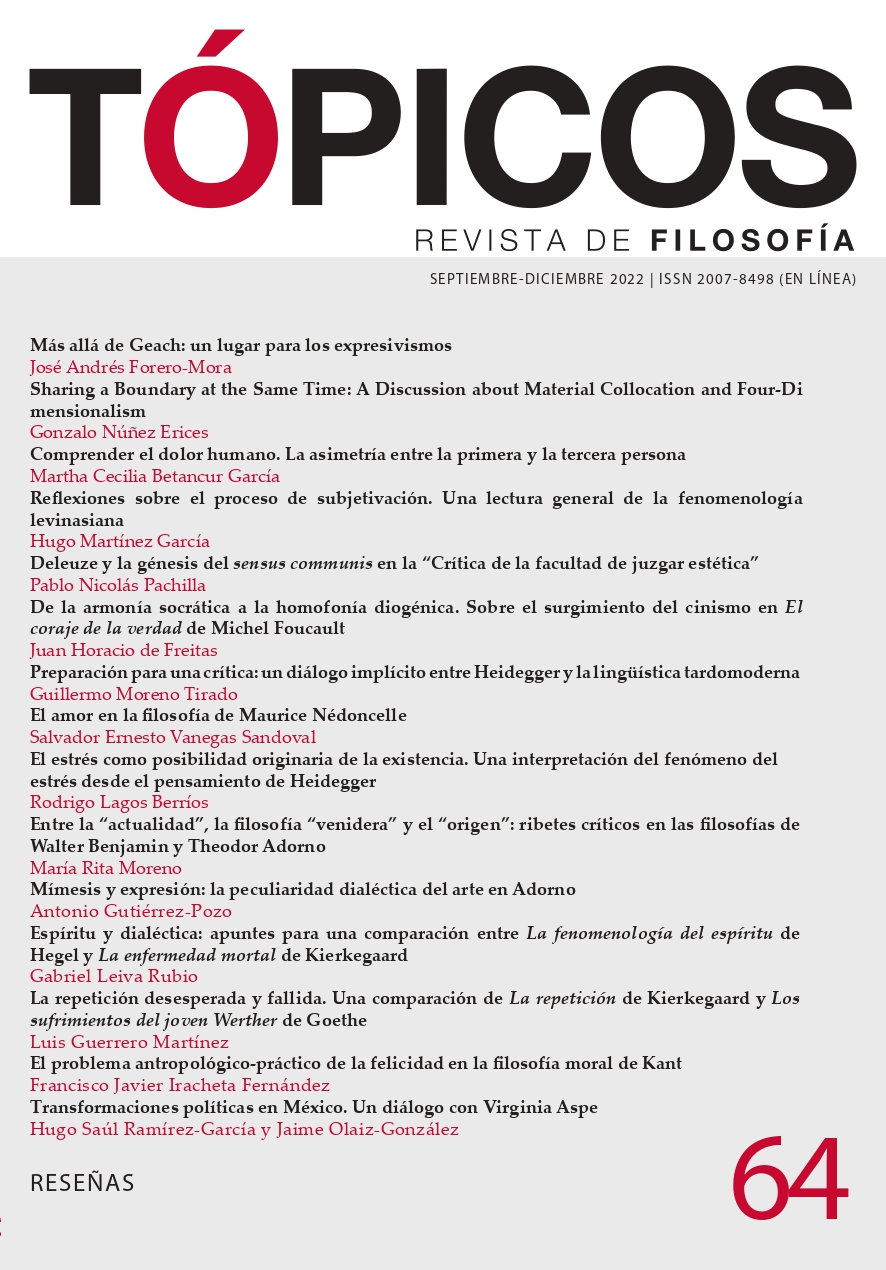Publicado 2022-08-13
Palabras clave
- expresivismo,
- argumento Frege-Geach,
- aserción,
- condiciones de verdad
Derechos de autor 2022 Tópicos, Revista de Filosofía

Esta obra está bajo una licencia internacional Creative Commons Atribución-NoComercial-SinDerivadas 4.0.
Cómo citar
Resumen
Según varios filósofos del lenguaje contemporáneos, el argumento Frege-Geach plantea una objeción genuina para el expresivismo semántico. En el presente texto se sostiene que una manera eficaz de enfrentar y superar este argumento es modificando la concepción expresivista clásica. Se examinan el expresivismo clásico y el expresivismo mínimo y se propone una versión de este último que, a la vez que supera la objeción derivada del argumento Frege-Geach, tiene la ventaja de incluir dentro del espectro del expresivismo teorías que claramente tienen este “espíritu” pero que la caracterización clásica deja fuera.
Referencias
- Ayer, A. J. ([1946] 1984). Lenguaje, verdad y lógica. R. Resta (trad.). Orbis.
- Brandom, R. (1994). Making It Explicit. Reasoning, Representing, and Discrusive Commitment. Harvard University Press.
- Brandom, R. (2013). Global Anti-representationalism? En H. Price (ed.), Expressivism, Pragmatism and Representationalism. (pp. 85-111). Cambridge University Press.
- Bar-On, D. (2015). Transparency, Expression, and Self-knowledge. Philosophical Explorations, 18(2), 134-152. DOI: https://doi.org/10.1080/13869795.2015.1032334.
- Bar-On, D. (2019). Neo-Expressivism: (Self-)Knowledge, Meaning, and Truth. Royal Institute of Philosophy Supplement, 86, 11-34. DOI: https://doi.org/10.1017/S1358246119000067.
- Bar-On, D. y Sias, J. (2013). Varieties of Expressivism. Philosophy Compass, 8(8), 699-713. DOI: https://doi.org/10.1111/phc3.12051.
- Chrisman, M. (2012). Epistemic Expressivism. Philosophy Compass 7(2), 118-126. DOI: https://doi.org/10.1111/j.1747-9991.2011.00465.x
- Forero-Mora, J. A. (2015). Verdad, metafísica y epistemología. Observaciones sobre la neutralidad de la verdad. Universitas Philosophica, 32(64), 283-312. DOI: https://doi.org/10.11144/Javeriana.uph32-64.vmte
- Forero-Mora, J. A. (2017). Comments to Wrenn’s Truth from a Prosententialist Perspective. Teorema, 36(1), 101-111.
- Frápolli, M. J. (2013). The Nature of Truth. Springer.
- Frápolli, M. J. (2019). Introduction: Expressivisms, Knowledge and Truth. Royal Institute of Philosophy Supplement, 86, 1-9. DOI: https://doi.org/10.1017/S1358246119000055.
- Frápolli, M. J. y Villanueva, N. (2012). Minimal Expressivism. Dialectica, 66(4), 471–487. DOI: https://doi.org/10.1111/1746-8361.12000.
- Frápolli, M. J. y Villanueva, N.(2013). Frege, Sellars, Brandom: expresivismo e inferencialismo semánticos. En D. Pérez Chico (ed.), Perspectivas en la filosofía del lenguaje. (pp. 583-617). Prensas de la Universidad de Zaragoza.
- Frápolli, M. J. y Villanueva, N. (2016). Pragmatism. Propositional Priority and the Organic Model of Propositional Individuation. Disputatio, 43(8), 203-217. DOI: https://doi.org/10.2478/disp-2016-0012.
- Geach, P. (1960). Ascriptivism. The Philosophical Review, 69(2), 221-225.
- Gibbard, A. (1990). Wise Choices, Apt Feelings: A Theory of Normative Judgement. Harvard University Press.
- Navarro, L. (2017). Inferencialismo en el discurso ético. Boletín de la Sociedad de Lógica, Metodología y Filosofía de la Ciencia, boletín especial, 66-80. URL: https://www.solofici.org/wp-content/uploads/2021/02/Boleti%CC%81n-de-la-Sociedad-de-Lo%CC%81gica-Metodologi%CC%81a-y-Filosofi%CC%81a-de-la-Ciencia-en-Espan%CC%83a-Especial-premio-al-mejor-trabajo-de-fin-de-ma%CC%81ster-15-16-noviembre-2017.pdf
- Pérez Carballo, A. y Santorio, P. (2016). Communication for Expressivists. Ethics, 126, 607-635. DOI: https://doi.org/10.1086/684714,
- Price, H. (2011). Expressivism for Two Voices. En J. Knowles y H. Rydenfelt (eds.), Pragmatism, Science and Naturalism. (pp. 87-113). Peter Lang.
- Price, H. (2013a). Prospects for Global Expressivism. En H. Price (ed.), Expressivism, Pragmatism and Representationalism. (pp. 147-194). Cambridge University Press.
- Price, H. (2013b). Two Expressivist Programmes, Two Bifurcations. En H. Price (ed.), Expressivism, Pragmatism and Representationalism. (pp. 22-44). Cambridge University Press.
- Price, H. (2019). Global Expressivism by the Method of Differences. Royal Institute of Philosophy Supplement, 86, 133-154. DOI: https://doi.org/10.1017/S1358246119000109
- Rabossi, E. (1971). Emotivismo ético, positivismo lógico e irracionalismo. Dianoia, 17, 36-61.
- Recanati, F. (2000). Oratio Obliqua, Oratio Recta: An Essay in Metarepresentation. The MIT Press.
- Richard, M. (2015). What Would an Expressivist Be? En S. Gross, N. Tebben y M. Williams (eds.), Meaning without Representation. Essays on Truth, Expression, Normativity, and Naturalism. (pp. 137-159). Oxford University Press.
- Ridge, M. (2007). Ecumenical Expressivism: Finessing Frege. Ethics, 116(2), 302-336. DOI: https://doi.org/10.1086/498462.
- Schroeder, M. (2008). What is the Frege-Geach Problem? En Philosophy Compass, 3(4), 703-720. DOI: https://doi.org/10.1111/j.1747-9991.2008.00155.x.
- Schroeder, M. (2015). Hard Cases Combining Expressivism and Deflationist Truth: Conditionals and Epistemic Modals. En S. Gross, N. Tebben y M. Williams (eds.), Meaning without Representation. Essays on Truth, Expression, Normativity, and Naturalism. (pp. 160-179). Oxford University Press.
- Schwartz, J. y Hom, C. (2014). Why the Negation Problem is not a Problem for Expresivism. Nous, 48(2), 824-845. DOI: https://doi.org/10.1111/nous.12068.
- Searle, J. (1962). Meaning and Speech Acts. Philosophical Review, 71(4), 423-432.
- Simpson, M. (2020). What Is Global Expressivism? The Philosophical Quarterly, 70(278), 140-161. DOI: https://doi.org/10.1093/pq/pqz033.
- Skorupski, J. (2012). The Frege-Geach Objection to Expressivism: Still Unanswered. Analysis, 72(1), 9-18. DOI: https://doi.org/10.1093/analys/anr136.
- Stevenson, C. L. ([1937] 1963). The Emotive Meaning of Ethical Terms. En Facts and Values. (pp. 10-31). Greenwood Press.
- Villanueva, N. (2018). Expresivismo y semántica. En D. Pérez Chico (ed.), Cuestiones de la filosofía del lenguaje. (pp. 437-470). Prensas Universitarias de Zaragoza.
- Wittgenstein, L. ([1921] 1994). Tractatus Logico-Philosophicus. J. Muñoz e I. Reguera (trads.). Alianza.
- Wright, C. (1998). Self-Knowledge: The Wittgensteinian Legacy. En C. Wright, B. C. Smith y C. Macdonald (eds.), Knowing Our Own Minds. (pp. 15-43). Oxford University Press.
- Yalcin, S. (2011). Non-factualism about Epistemic Modality. En A. Egan y B. Weatherson (eds.), Epistemic Modality. (pp. 295-330). Oxford University Press.





